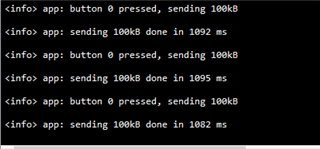Hello,
We're trying to optimize the data transfer rate from our nRF52832 based peripheral device to the mobile phone. Tested with two different BLE >= 5 Android phones we encountered a weird behavior and would like to get your help to resolve it.
Our device uses SoftDevice s132 v6.1.1 and SDK 15.3 and in the beginning of the connection we set
MTU: 161 (RAM limited)
DLE: rx: 165 , tx: 165
The phone that I use (OnePlus 8) approves the MTU and requests DLE rx: 251, tx: 27 so the final negotiation results 165 (periph->central), 27 (central->periph). The phone is typically content using PHY_1M and this results the throughput (measured with Ellisys sniffer) of about 60kB/s which is pretty much what I would hope for it.
As soon as I change the connection to PHY_2M (either with nRF Connect debug mode on the phone or requesting it from the device software) the speed drops by about 50% resulting around 30-35 kB/s. The sniffer revealed the reason to be that the data length was dropped to 27 resulting a lot of very small packets. Initially I thought that the reason for this was the nrf_ble_gatt -module which I had enabled to take care of DLE and MTU settings since the RTT logs revealed some GATT module printouts and there was this really weird comment in the code ("The SoftDevice only supports symmetric RX/TX data length settings."), so I removed the GATT module and replaced the funtionality with direct SD calls.
However even after specifically setting DLE to (165,165) the connection defaults to 27 byte packets and really slow connection as soon as I set PHY_2M. This is really weird since the 1M PHY works great and I didn't think there was any extra limitations on DLE because of different PHYs. I did try to search for help in SoftDevice specification but did not find anything that sounded relevant...
Thank you in advance,
Petri L.
ps. I have the Ellisys logs available (the PHY_2M case with GATT module) but would like to keep them confidential if possible.



